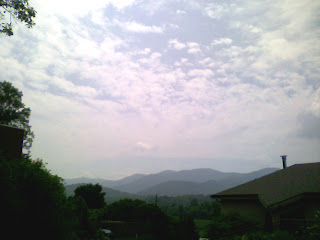Today I heard a wonderful Aztec poem. It's anonymous, so I think it's safe to write it in completely below:
"The artist: disciple, abundant, multiple, restless.
The true artist: capable, practicing, skillful;
maintains dialogue with his heart, meets things with his mind.
The true artist: draws out all from his heart,
works with delight, makes things with calm, with sagacity,
works like a true Toltec, composes his objects, works dexterously, invents;
arranges materials, adorns them, makes them adjust.
The carrion artist: works at random, sneers at the people,
makes things opaque, brushes across the surface of the face of things,
works without care, defrauds people, is a theif."
The lecturer said that for "carrion" we might read "post-modern." Ouch, but right on.
I also heard a fascinating lecture by Bruce Haxton on cliche. I'm currently muddling over the difference between cliche, dead metaphor and live metaphor. Haxton argued that cliche, though not perhaps the aim of poetry, works quite effectively occasionally and then because it can rely on a commonality between reader and writer. A completely novel metaphor has fewer such commonalities to moblize for its effect. A dead metaphor -- "the leg of a chair" or "the brook ran around the hill" -- seems to assume complete commonality of meaning between reader and writer: for both, "leg" and "run" transfer meaning (i.e. perform metaphorically) but in a complete way. In a novel metaphor, such as Yeat's "their throats were the throats of birds," the reader must perform many more (in fact, an infinite, incompletable series) of transformations on the terms to find the common meaning. A cliche seems to be somewhere in between these two ends.
Finally, I got really angry at a lecture on metaphor itself. The lecture was given by a well-known poet who presented a sort of big-picture historical (i.e. Neanderthals on) account of language development in relation to myth and metaphor. He concluded by appealing to Chompskian linguistics as evidence that language is hard-wired... and then somehow that myth was also hard-wired. (I am no expert in Chompsky, but I'm pretty sure he specifically separates cultural and linguistic practices. I tried to mention
the Piruhua controversy, but he would have none of that) He also claimed that Kantian dualism was just like the left-brain right-brain split (which caused me to tear up some near-by paper), and that MRI scans can "without a doubt" prove that you are lying. (see
a New Yorker article that pans exactly that assertion) It's not just the New Yorker but lots of conscientious cognitive scientists who'd admit that MRIs, while very cool, are not the final word on intentionality.
Although I had a personal distaste for the lecture because he was a stodgy old white man, I also had fear for the audience. This group of poets and writers took his word as gospel! The humanities bowed before the idol of the MRI. Instead of the poets and shamans having powers, it's the techies. Far from advocating a return to shamanism, I wish more humanities people (including myself!) were better educated to be able to assess these assertions without blindly sliding into scienticism. Perhaps a bit of scientism is a healthy for the humanities that can suffer equally from Romanticism, but it all has the air of mysticism... Yeats bought into automatic writing and they're looking at MRI scans, the latest phlogiston.
In any case, I certainly won't have to deal with that lecturer's brand of scientism any more because I offended him enough to ward of future conversations...
Now to bed and up early for more poetry boot camp...




